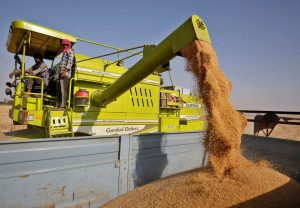Russia’s import of wheat is hampered by red tape.
A price of $372 per tonne had been proposed for the import of 300,000 metric tonnes of wheat.

ISLAMABAD: Administrative obstacles prevented the government-to-government (G2G) import of wheat from Russia at lower costs. In spite of the cheaper offer from Russia under G2G, a summary was submitted to the Economic Coordination Committee (ECC) for approval of a tender for the import of wheat. The contract was accepted by the economic decision-making body after the lowest bidder in the tender offered a price of $373 per tonne. $384 per tonne was the price provided by the second-lowest bidder.
But according to insiders, Russia had bid $372 a tonne for the import of 300,000 metric tonnes of wheat, which was less than the lowest bid. However, the relevant ministry responsible for imports of wheat failed to even inform the ECC of the Russian offer. Instead, it was disclosed to the group that makes economic decisions that the negotiations with Russia have not yet been concluded. This is true despite the fact that Shehbaz Sharif, the prime minister, had commissioned research into the possibility of importing wheat on a G2G basis in order to conserve foreign cash. ECC was made aware last year that the government has the option to acquire wheat from Russia at a G2G price of $280 per tonne.
However, Pakistan lost the chance to import wheat at a lower price due to administrative red tape. The concerned ministry planned to retell the same narrative as it requested authorization to import wheat at prices higher than those provided by Russia. When the Pakistan Tehreek-i-Insaaf (PTI) administration was in power, intermediaries and hoarders stocked up on wheat to drive up prices, triggering the nation’s wheat crisis. Another factor contributing to the loss of wheat flour from the market was widespread smuggling to Afghanistan. The administration has been trying to create strategic reserves in order to deal with any wheat shortfall the nation may experience, keeping in mind the situation encountered in the past.
Saeed Ahmad Nawaz, the managing director of Pakistan Agricultural Storage and Services Corporation (PASSCO), stated that “the rains and floods had damaged the wheat supply at the government warehouse. The damaged stock of wheat has been successfully separated from the wheat that is fit for human consumption, and it is currently being provided. “Given the current circumstances, food security might continue to be an issue in the upcoming months. Farmers have been deterred from planting wheat because of the high costs of urea, energy, and other inputs, he continued.











































